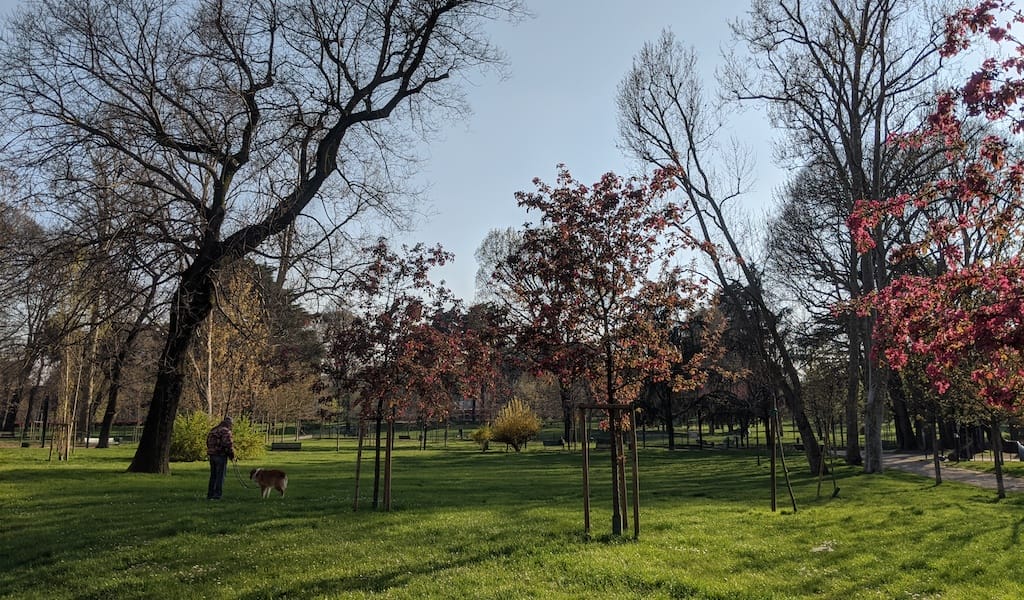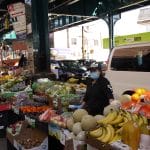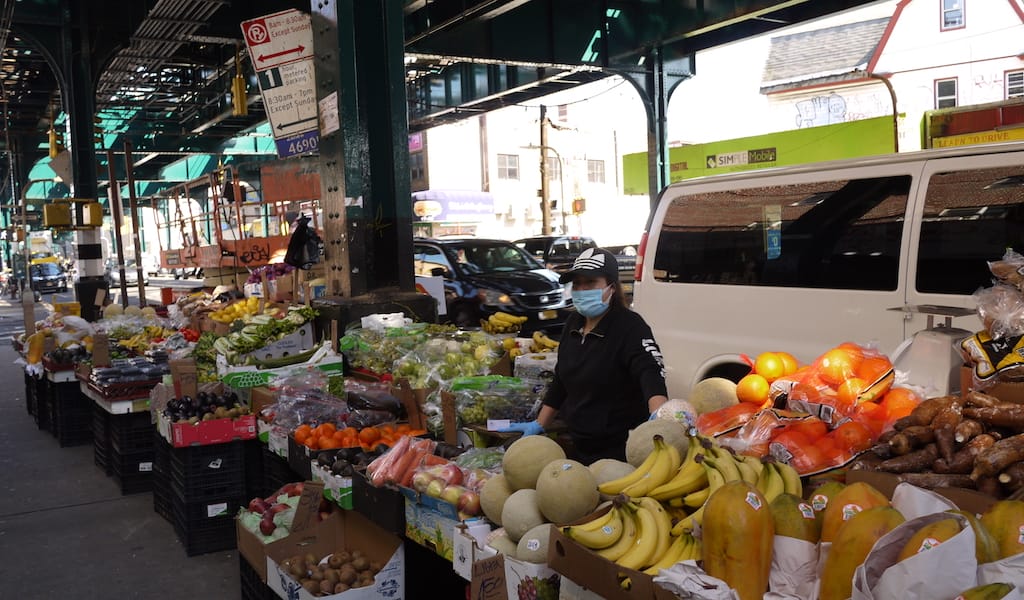Editor’s note: We don’t operate in Milan, but it’s the home of our managing editor, Emma Harper. So we asked her to share her experience living under lockdown in the epicenter of Italy’s outbreak.
The first thing I noticed on lockdown in Milan, and the thing that has stuck with me the most, is the barking. Our apartment sits on a noisy thoroughfare, with cars and trams running by at all hours. But now, save for the errant tram, it’s quiet and still; the piercing, fearful dog barks ring out and bounce between the buildings that line my street, amplified by the silence. The only sound that can drown them out is an ambulance siren.
It’s safe to say that the Milanese are dog people: Canines crowd the parks and streets, join their owners on the metro, and tag along for caffè and a brioche at the bar. Dachshunds – or sausage dogs, as I grew up calling them – are ubiquitous, but there are big breeds too. Our nearby park has three different dog enclosures where they can run off leash, and whenever my 11-month-old daughter and I go for a stroll, we always make it a point to stop at each one – her mouth hangs open and her small head darts back and forth as she follows them with her eyes.
The park had been our saving grace. On February 22, the day after a large number of coronavirus infections in Lombardy were confirmed, my husband and I flew back from the UK, where we were visiting his family. Our flight departed at an ungodly early hour. But, as the almost-empty plane descended over the Alps, we consoled ourselves with the thought that at least we could walk through the park and stock up at our local farmers’ market.
It was a brilliantly sunny day, and the park was packed with families. We normally would put our daughter in the swings, but the news had set us on edge – the crowded playground suddenly seemed unsafe. We ran into some friends while walking the paths, but stayed a good few meters away as we compared notes on the situation.
On our way home, we stopped into our local Arci Association, a string of non-profit cultural centers across the country, for a new-to-us farmers’ market – it was a tiny affair, with only six or seven local vendors, all of whom seemed to know each other and were happily sampling the goods at each stall. In addition to a granny cart full of vegetables, we took home two kilos of oranges, a loaf of brown bread studded with caramelized onions, and creamy yogurt made with buffalo’s milk. We talked excitedly about shopping there regularly – maybe this was the farmer’s market that would finally compel us to break up with the chain grocery store. Within a week, the cultural center was shut.
At first, things weren’t normal but they weren’t so different. A high school teacher at an international school, my husband started online instruction, and our nanny was still coming. The apartment felt cramped with three adults and one baby, so I worked at our local bar, R&D, where they wiped the tables more studiously and I was more liberal with my small bottle of hand sanitizer. Early on, once the owner was out of earshot, my favorite bartender, Alison, told me that I should probably be staying home. I explained about the tight quarters, and she seemed to understand. Each morning, as the crowd thinned, she served my cappuccino with a smile and an increasingly longer chat – I think she liked the company.

Since we were both working from home and had a nanny until the early afternoon, my husband and I sometimes dipped out of the apartment and, feeling more like carefree college students than parents to a young child, strolled to one of our neighborhood spots for lunch. A city of migrants, Milan offers cuisine from all around the boot, and beyond. The nearby Roman restaurant – Maurino Osteria Romana, a casual red-and-white checkered-tablecloth joint – does a booming lunch trade, with a 10 euro set menu that comes with a primo, secondo, water, a quarter liter of wine, and a coffee.
On Friday, February 28, the menu offered the gooey, rich comfort that the uncertain times called for: mezze maniche crema di patate e guanciale, a squat ridged pasta covered in a creamy potato sauce and peppered with crispy pieces of cured pork cheek, followed by puntine di maiale con patate al forno, baked pork ribs with potatoes. Owner Maurino, the restaurant’s namesake, seemed distracted. Even though the crowds kept coming in, his normal waitstaff weren’t around. We still had this feeling of not quite invincibility but certainly that things wouldn’t necessarily need to change for us.
School closures were extended and the sidewalks grew less crowded, but our social life forged on. We had another couple over for dinner; I went out with friends for a meal and some drinks. It’s embarrassing, and sometimes even physically painful, to look back at how glib we were – the memory of every meet-up, every game night, every offhand comment about how it’s no worse than the flu now makes me squirm with discomfort.
The big change came when Lombardy was locked down on Sunday, March 8 (the lockdown was later extended to all of Italy on Monday, March 9). WhatsApp group chats pinged with rumors the night before but it wasn’t until we woke up on Sunday – early, to go on a hike – that the lockdown was officially announced. After much back and forth, we decided that my husband should go to the supermarket right when it opened, certain that it would be picked bare by the evening. When he got back, we bundled up the baby and packed the rental car, determined to still get in a short hike, our last one for quite a while. Our young neighbors, the ones with a yappy sausage dog, were at the entrance to our building with suitcases packed – we haven’t heard a peep from their apartment since.
Our nanny stopped coming. To let off steam after the long days of work and child wrangling, we walked laps in the park with the baby in her carrier, keeping her close. On the night of March 11th, Giuseppe Conte, Italy’s Prime Minister, announced that all businesses except those providing essential services, like grocery shops and pharmacies, would be shuttered. Having heard that everything might close, I ran over to Fresh Milano, our local gelateria, after putting the baby to bed, snagging one last container of gelato before they pulled down their shutters.
The park, where we implemented that truism of “one foot in front of the other,” where the dogs ran free, where the police roamed (well, they’re still roaming), where, around 5 p.m., the term “sun dappled” never seemed more right, was taken away from us on March 20. The ban on open-air sports and exercise and the closing of the parks pushed us further indoors, where the walls are at once comforting and suffocating. I barely go outside now. If it makes the numbers go down, it’s worth it. But that doesn’t mean it’s easy.
The incremental nature of these constraints has made them harder to accept. Or maybe that’s what I want to believe – it feels like we are the guinea pigs for the rest of the Western world. Everyone wanted to know what it’s like in Italy, but less so now that the virus is spreading rapidly in the US, the new epicenter. On the one hand, it’s nice not being in the spotlight so much. On the other, the situation here still feels dire.
Once a week I go to the supermarket. It’s a big event now, the new sun around which my life revolves. I wait in line, one of the few without a mask and gloves. A tall man takes my temperature, bending down to wave the thermometer near my forehead. I load up on staples, but also buffalo mozzarella and salame di Milano and Haribo and miniature ice cream cones – too much for my granny cart alone, so my chapped hand also grips a large reusable bag on the walk home.

Normally content to let my husband do the cooking, I’ve started making my mother’s recipes: slow-simmered tomato sauce with sausage and meatballs, macaroni and cheese (the roux always takes longer than expected), applesauce. I feel closer to my parents and brother, far away in the States, on these nights. One day I miss Istanbul, where I used to live, and decide to make börek, doubling the filling of spinach and white cheese. I even made dense, nutty oatmeal bars, the same ones I devoured in the early months of breastfeeding, for a friend who gave birth in mid-March – a primal kind of joy welled up inside me when she texted me the news. A baby amidst all this sadness.
My daughter has no idea about the coronavirus – all she knows is that mom and dad are home all day, every day. She started walking under lockdown, tottering like Godzilla on her pudgy legs. When she sees something she shouldn’t have, she instead drops down to all fours and, with a mischievous glint in her eye, takes off. On days when one of us goes to the supermarket, we give her poached salmon and strawberries for dinner, which she gleefully stuffs in her mouth. She tires us out but is also the source of a thousand different delights.
After we put her to bed, we sit down with a glass of wine or a beer, one of the few things we get delivered in what feels like a paltry effort to support small breweries and wine shops, and laugh about her latest strange noise or habit. Once a week, we pair that wine or beer with takeout pizza from Pizzeria Marina down the street, one of many in a long line of indulgences that take the edge off. We saw Gino, the owner, a few days before the ban on parks was announced while on one of our nightly walks. He popped his head out the door to say hello and gave a big smile and wave to our daughter, whom he met when she was just a week old. We asked how things are going. He smiled and shrugged, telling us that things aren’t great but also not so bad, given the circumstances. He quickly excused himself to go back inside – long conversations on the street are not really a thing these days.
We’ve been lucky, in a way. Northern Italy is an epicenter, yes, but the city with the most deaths is Bergamo, Milan’s neighbor to the east. The words that come to mind – heartbreaking, devastating – all sound trite. It’s a lot to take in. I read more and more and more, but I also look outside and force myself to notice the greening trees. I watch an almost empty tram rattle by my apartment and fantasize about jumping on, riding it to the other edge of the city. I hear the dogs bark and think, surely they have always been there.
Published on April 03, 2020
Related stories
March 4, 2021
TbilisiIt has been 12 months since the novel coronavirus was first detected in Georgia. It was about the same time two CB colleagues, Celia from Lisbon and Chiara from Naples, arrived for a brief visit and joined us for what would be one of our last food walks of the year. Later, we went to…
March 31, 2020
Mexico CityIn 2009, the A(H1N1) virus, known colloquially as the swine flu, hit Mexico hard. Only a few months before the outbreak began, I had moved from San Miguel de Allende to Mexico City trying to rescue a broken relationship. I had to take the most boring job in the world: a customer service agent at…
March 27, 2020
QueensI have sat down to write this three or four times, and every time I stop, scrap everything and start all over. For many reasons, the most important being that things are changing so fast – every time I finish, the information I have included is inaccurate. More and more restaurants are closing, businesses are changing…


















































































